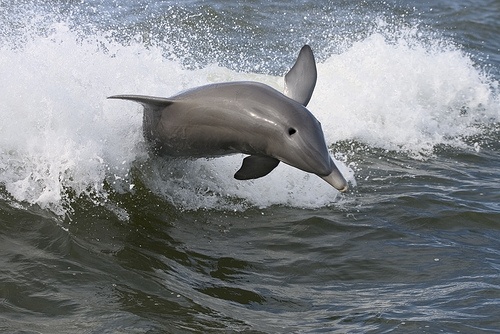We have much more to do and your continued support is needed now more than ever.
Speak Up for Gulf Dolphins—Make Sure BP’s Oil Spill Fines Are Used for Restoration

But, unlike television, we cannot just write a new scene and magically heal the dolphins. NOAA scientists still haven’t concluded why dolphins are dying across much of the northern Gulf of Mexico, but an in-depth study of 32 dolphins in a heavily oiled section of the Louisiana coast found that many were seriously ill with a constellation of symptoms reminiscent of oil exposure in other mammals.
Congress to the Rescue — Seriously
The RESTORE Act, which became law last summer, gives us our best chance to comprehensively clean up the Gulf and improve habitat for dolphins and many other species of wildlife. Thanks to this new law, The Gulf Coast Ecosystem Restoration Council will be holding hearings throughout the five Gulf States to discuss the development of their comprehensive plan to restore the Gulf ecosystem.
This plan will outline which ecosystem restoration projects will be implemented throughout the Gulf of Mexico. The Council is in an early stage of plan development and intends to release a draft for public comment in spring 2013. This money from the RESTORE Act gives us our best opportunity to heal the Gulf of Mexico, but there are some who would like to dip into the RESTORE Act’s dedicated restoration dollars and use these funds for “economic restoration,” a.k.a pork.
Ensure that DOJ holds BP fully accountable for their actions>>
Speak Up in Person for Dolphins in the Gulf
Let the Council know that:
- We commend the Council’s commitment to directing 30 percent of the funds to ecosystem restoration under the comprehensive plan as required by the RESTORE Act.
- In addition, the Council should seek to influence state-specific plans to prioritize ecosystem restoration, and oppose any projects that have negative environmental impacts. This will ensure that state-specific projects enhance the environmental benefits of the broader comprehensive plan.
- While every ecosystem restoration project helps restore and sustain the Gulf’s natural resource-based economy, some purely economic development projects threaten to harm its environment. From the Gulf’s $41 billion recreational fishing impact to its $31 billion tourism industry, the region’s economy relies on a clean and healthy environment. Gulf ecosystems, and the rich resources they support, are also key to the broader national economy.
- In the spirit of the promises made by the President and leaders in Congress, we strongly urge the Council to tighten its focus on restoring the environment, and reject any project that undermines that goal.
- The people of the Gulf rely on meaningful environmental restoration, informed and supported by science, to support a strong and healthy economy now, and for generations to come.
- Restoring the Gulf’s environment, cleaning up our coastlines and rebuilding our wetlands will protect people and property from future hurricanes and flooding, create new jobs and safeguard the fishing, tourism and other jobs that depend on a healthy Gulf of Mexico.
- Restoration must take a comprehensive ecosystem-scale approach—this means addressing everything from freshwater inflows to our estuaries to our offshore marine environment.
Make a Difference at the Hearings
The public engagement sessions are part of the Council’s efforts to ensure robust public input throughout the entire process. And it is of dire importance that the public – you, me, and your uncle Bob – get out to these hearings to voice support for using all of the RESTORE Act dollars slated for ecosystem restoration on comprehensively restoring the Gulf of Mexico
RSVP for one of these upcoming public meetings:
Tuesday, March 12
Texas – Doors open at 5:15PM and the program will be 6:00 to 8:00PM
Pasadena Convention Center, 7902 Fairmont Pkwy Pasadena, TX 77507
Wednesday, March 13
Florida – 6:00 PM EST
Karen A. Steidinger Auditorium, Fish and Wildlife Research Institute, 100 Eighth Ave. S.E., St. Petersburg, FL
![]() Help protect Gulf dolphins! Ensure that the Department of Justice holds BP fully accountable for restoring Gulf habitat! And make sure that money is spent on ecosystem restoration not pork!
Help protect Gulf dolphins! Ensure that the Department of Justice holds BP fully accountable for restoring Gulf habitat! And make sure that money is spent on ecosystem restoration not pork!




















